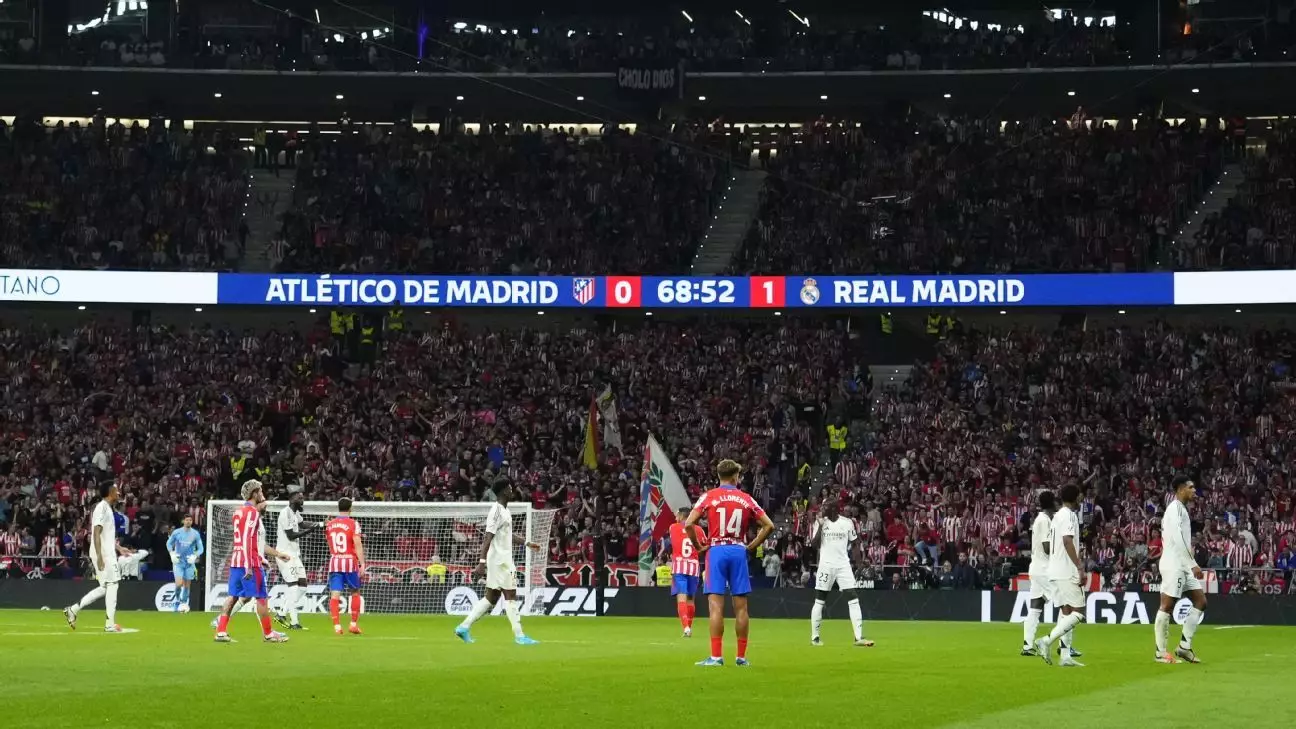On a night that should have celebrated the fierce rivalry between Atlético Madrid and Real Madrid, the atmosphere at the Metropolitano Stadium turned tense and chaotic. With the scoreboard reading 68:30 and Real Madrid leading 1-0 thanks to Éder Militão’s goal, the match was suddenly suspended, interrupting what was supposed to be a thrilling encounter. The suspension followed a series of unruly behaviors by a section of Atlético Madrid fans, who began to throw objects onto the pitch, infuriated by the former Atlético player Courtois’s exuberant celebration. What was supposed to be an exciting evening of football quickly devolved into a significant concern for player safety and stadium decorum.
The Role of the Officials and Player Reactions
Referee Mateo Busquets Ferrer demonstrated commendable judgment in prioritizing player safety by halting the match multiple times after objects were repeatedly thrown onto the pitch. Both Real and Atlético coaches, Carlo Ancelotti and Diego Simeone, respectively, acknowledged the referee’s decision as the correct course of action. Simeone, along with key players like Koke and José María Giménez, even took the initiative to appeal directly to fans, urging them to rein in their emotions for the sake of the team.
“It was a moment of a lot of tension,” stated Koke, illustrating the precarious situation. The conversations between players and fans shed light on a deeply rooted theme in sports culture—the idea that the actions of players can influence the behavior of supporters. This brings up a significant question about responsibility and how far players should go in managing their interactions with fans.
The events that unfolded at the Metropolitano emphasize a critical paradox in sports: the thin line between passion and provocation. Players are often the catalysts of emotion within stadiums, and as such, it is essential that they act with a certain level of responsibility. Both Simeone and Koke pointed out that Courtois’s celebration may have acted as a trigger for the unruly behavior from a subset of fans. While this does not condone the actions of the fans, it highlights the entertainment aspect of football intertwined with the power of athlete influence.
Simeone’s commentary about provocations initiated by players reflects a broader concern about player conduct, especially during heated rivalries. Footballers carry the weight of their clubs on their shoulders, and their actions—whether intentional or not—resonate with thousands in the stands. One must ponder whether the current football culture should recalibrate focus on how players express their emotions in high-stakes moments, especially when their actions might incite negative responses from the crowd.
Following what was an unprecedented halt to a significant derby match, the game resumed but did so with a notably diminished atmosphere. The long delay understandably shifted the emotional tenor of the match, leaving a marked impact on player performance. Despite Atlético’s Ángel Correa scoring a last-minute equalizer, the post-match conversations revolved more around the crowd’s behavior rather than the sporting outcome.
Atletico Madrid’s management responded swiftly by releasing a statement condemning the actions taken by a fraction of their supporters. Identifying and addressing issues arising from fan misconduct is crucial for maintaining the integrity of the sport. In a broader sense, the club’s readiness to cooperate with authorities in managing the situation highlighted the importance of accountability in modern football.
This incident raises questions not just about immediate responses but also about the essence of football culture in contemporary society. The interactions between passionate fans and professional athletes should ideally be constructive and supportive. Instances like these showcase how easily that relationship can flip into chaos if various stakeholders do not collectively hold responsibility for their actions.
The onus falls on football clubs, players, and fans alike to foster a culture where mutual respect transcends the impulsive nature inherent in sporting rivalries. By reflecting on incidents like this, stakeholders can strive for harmonious spectator experience that enhances the sport instead of detracting from it.
The suspension of a match that should have celebrated fierce competition is a troubling reminder of how readily passion can spiral into disorder. The incident at the Metropolitano was more than a disruption; it is a call to action for all involved in football to unify around principles that cherish safety, respect, and responsibility in the beautiful game.

Leave a Reply